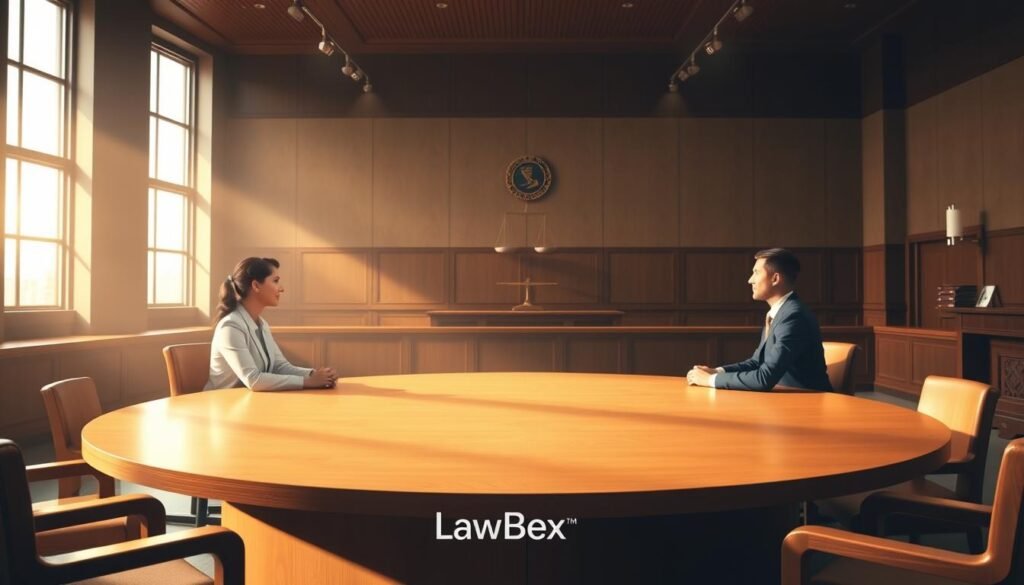Child custody can be tough to handle, but with the best tips for custody, you can get the best for your family. A study showed that about 70% of custody cases are settled through mediation. This shows how crucial it is to be well-prepared and proactive. In this guide, we share 10 top tips to focus on your child’s happiness, create good co-parenting plans, and safeguard your rights during custody battles.
Key Takeaways
- Understand the difference between physical and legal custody to make informed decisions.
- Develop a comprehensive parenting plan that addresses schedules, special occasions, and communication strategies.
- Learn effective conflict resolution techniques to navigate disagreements with your ex-partner.
- Explore the benefits of shared custody arrangements and how to make them work for your family.
- Protect your child’s emotional well-being by prioritizing their needs throughout the custody process.
Prioritizing the Child’s Well-Being
When it comes to custody arrangements, the child’s well-being is most important. As parents, we aim to create a nurturing environment for our children. This means focusing on their emotional, physical, and developmental growth.
We need to balance creating a caring space with keeping things stable and routine. This balance is key to our children’s happiness and growth.
Fostering a Nurturing Environment
A nurturing environment is vital for a child’s development. It should be safe, loving, and supportive. Our child should feel secure and understood in their home.
We should provide a space where our child can grow and thrive. This includes access to activities, education, and chances to express themselves.
Maintaining Stability and Routine
Stability and routine are crucial for a child’s well-being. Children like knowing what to expect. Changes can upset them.
We must keep our child’s life as consistent as possible. This means stable living arrangements, schedules, and routines. It helps them feel secure and comfortable, even in tough times.
| Factors to Consider for the Child’s Well-Being | Nurturing Environment | Stability and Routine |
|---|---|---|
| Emotional Support | ✓ | ✓ |
| Physical Needs | ✓ | ✓ |
| Educational Opportunities | ✓ | ✓ |
| Consistency in Daily Life | ✓ | ✓ |
By focusing on our child’s well-being, we can make this transition better for them. Their needs should always be our top priority.
Best Tips for Custody: Effective Co-Parenting Strategies
Handling a custody arrangement can be tough and emotional. But, good co-parenting strategies can greatly help your child. Our main goal as parents is to give our kids a safe and loving place, even when we disagree.
Here are our top tips for co-parenting well:
- Always talk openly and kindly with your ex. Find a clear way to share news and big decisions about your child.
- Keep a steady routine for your child. Make sure both homes have a similar schedule. Kids love knowing what to expect.
- Make choices together, always thinking of what’s best for your child. Don’t use your child to settle scores or involve them in fights.
- Be ready to bend and find common ground. Custody plans might change, and working together helps your child.
- Support your child’s bond with the other parent. Don’t say bad things about your ex in front of your child.
Using co-parenting strategies and focusing on your child’s needs is key for handling custody arrangements. By working together, you can build a caring and supportive space for your child, even in tough times.

“The most important thing is to remember that your child’s well-being should always be the top priority, regardless of your personal differences with your ex-partner.”
Understanding Legal Custody Rights
Child custody can be complex, but knowing your rights is key. It helps protect your role as a parent and your say in big decisions. We’ll look at physical and legal custody and how state laws affect them. This knowledge helps you make choices that are best for your child.
Physical Custody vs. Legal Custody
Physical custody means where the child lives. Legal custody is about making big decisions like education and healthcare. Sometimes, one parent has physical custody, but both share legal custody. Other times, custody is split equally.
Navigating State Laws
Child custody laws differ by state. Knowing your state’s laws is important. They affect your rights and duties as a parent. Some states favor joint custody, while others might lean towards sole custody.
| State | Legal Custody Preference | Physical Custody Preference |
|---|---|---|
| California | Joint legal custody is the default, unless there are concerns about the parents’ ability to cooperate. | No presumption of joint physical custody, but courts consider a range of factors to determine the best arrangement. |
| New York | Courts aim to award joint legal custody, unless one parent is unfit or there are concerns about decision-making ability. | No presumption of joint physical custody, but courts consider the child’s best interests and the parents’ ability to cooperate. |
| Texas | Joint legal custody is the preferred arrangement, unless there are clear reasons to award sole legal custody. | Courts generally favor joint physical custody, unless one parent is deemed unfit or unable to provide a stable environment. |
Understanding legal custody rights and state laws helps you navigate custody better. It ensures the best for your child.
Building a Solid Parenting Plan
Making a good parenting plan is key for your child’s stability and clarity. As parents, we need to think about many things. This ensures our plan is best for our child.
Establishing Clear Schedules
Clear schedules are a big part of a good parenting plan. We should make a detailed schedule. It should cover weekday and weekend visits, holidays, and other big events.
This structure keeps our child’s life steady and secure.
Addressing Special Occasions
Handling special times like birthdays and holidays can be tough. Our plan should figure out how to make these times special for our child. This might mean taking turns on holidays or finding new ways to celebrate together.
| Parenting Plan Element | Importance | Considerations |
|---|---|---|
| Custody Schedules | Provides structure and stability for the child | Weekday, weekend, holiday, and vacation schedules |
| Special Occasions | Ensures the child feels celebrated and supported by both parents | Birthdays, holidays, school events, and other important milestones |
| Communication and Cooperation | Fosters a collaborative co-parenting relationship | Discussing changes, making joint decisions, and resolving conflicts |
By focusing on these important parts, we can give our child the stability and support they need. This is crucial during this time of change.

Communicating Effectively with Your Ex-Partner
Talking well with your ex-partner is key for a good co-parenting relationship. Life after divorce can be tough, but we must put our child first. This helps us work past our differences.
Here are some tips for better communication with your ex-partner:
- Set Clear Boundaries: Decide what you’re okay talking about and when. Stay away from big fights or old arguments.
- Focus on the Child’s Needs: Talk about your child’s needs, schedule, and happiness. Don’t use your child to send messages or make deals.
- Use Neutral and Respectful Language: Try to speak calmly and kindly. Avoid insults and angry words, as they can make things worse.
- Compromise and Collaborate: Be ready to find middle ground and work together for your child’s benefit. Be open and flexible in your talks.
- Seek Professional Mediation: If talking directly is hard, think about getting a mediator. They can help you find common ground.
By communicating with your ex-partner well, you can make co-parenting smoother. This way, your child’s needs stay first. It’s not simple, but with patience and focus, you can handle this new phase with dignity.
“The quality of our communication can make or break our co-parenting relationship. By focusing on our child’s needs and finding ways to work together, we can create a healthier environment for everyone involved.”
Managing Conflicts and Disagreements
Conflicts and disagreements are common in the custody process. But, with the right approach, they can be managed well. When you and your ex-partner disagree, focus on the child’s needs. It’s important to work together effectively.
Seeking Professional Mediation
Seeking professional mediation is a great way to solve conflicts. A neutral mediator can help you and your ex-partner talk better. They can find common ground and solutions that work for everyone. Mediation is key in managing conflicts and keeping your child’s best interests first.
Focusing on the Child’s Needs
- When emotions are high, remember the child’s needs are most important.
- Don’t use your child to get back at your ex. Instead, work together for their benefit.
- Try to see things from your ex’s point of view and find common ground.
By focusing on your child’s needs and getting help when needed, you can handle conflicts well. This ensures a positive outcome for your family.

| Effective Strategies for Managing Conflicts | Benefits of Professional Mediation |
|---|---|
|
|
“In the midst of conflict, it’s essential to remember that the child’s needs should always come first. With patience, empathy, and a willingness to work together, solutions can be found that benefit the entire family.”
Shared Custody: Making It Work
Shared custody can be tough, but it’s doable with the right approach. It’s all about working together as co-parents, focusing on the child’s happiness. This way, both parents and kids can thrive.
Keeping the lines of communication open with your ex is key. Creating clear schedules and planning for special days helps keep things stable for the child. It’s hard, but it’s crucial for the child’s well-being.
- Prioritize the child’s needs over personal feelings
- Foster a nurturing and consistent environment across both households
- Maintain open communication and a cooperative co-parenting relationship
Being flexible is also important in shared custody. Life can change suddenly, and plans might need to adjust. By staying focused on the child’s needs, parents can make these changes smoothly.
“The key to successful shared custody is putting the needs of the child first, above all else.”
To succeed in shared custody, parents must commit to co-parenting. They need to put the child’s emotional health first. With these strategies and a cooperative spirit, parents can give their child the love and support they need, even with shared custody.
Sole Custody: Navigating the Challenges
Getting sole custody can be tough and emotional. But, with the right help, you can face these challenges and focus on your child’s happiness. We’ll guide you on keeping a good relationship with your child and involving the other parent when it’s right.
Fostering a Healthy Relationship
Getting sole custody is just the start. The real challenge is keeping a loving home for your child. Work on a strong bond with your child, making them feel safe, loved, and supported. Create routines, spend quality time, and make your child feel stable and happy.
Involving the Non-Custodial Parent
It might be good to let the other parent be part of your child’s life. This is if they can have a good relationship with your child and keep them safe. Try to make a parenting plan that focuses on your child’s needs and works for both parents.
The path to sole custody is hard, but with the right approach and focus on your child, you can succeed. You can build a caring home where your family can grow and flourish.

“The most important thing is to make sure that the child’s needs are met and that the child is in a safe and secure environment.” – [https://www.bryanfagan.com/blog/2024/september/sole-custody-in-texas-what-you-need-to-know/]Family Law Attorney
Protecting Your Child’s Emotional Well-Being
Keeping your child’s emotional health safe is key during custody battles. As parents, we must find ways to support their mental health. We need to help them adjust and feel secure and loved.
Talking openly with your child is very important. Let them share their feelings and worries without fear of being judged. Make sure they know their feelings are real and understood. This helps them deal with the changes they’re facing.
- Keep your child’s life as stable as possible. Stick to routines and familiar places. This helps them feel secure when things are uncertain.
- Don’t speak badly about your ex in front of your child. Avoid showing anger or resentment. Talk in a way that focuses on your child’s needs.
- Consider getting professional help, like counseling. A therapist can offer valuable advice and tools to help your child cope.
By focusing on your child’s emotional health, you can help them grow strong and resilient. Always put their happiness and safety first in your decisions.
Learn more about protecting yourparental rights during a child custody.
“The greatest gift we can give our children is to help them feel safe, loved, and supported during challenging times.”
Custody Battle Preparation
When a custody battle is unavoidable, thorough preparation is key. You need to document critical evidence and seek the guidance of experienced legal counsel. This approach safeguards your rights and your child’s best interests.
Documenting Evidence
Meticulously documenting relevant evidence is a crucial step in a custody battle. This includes compiling medical reports, text messages, emails, and any other documentation that supports your case. Keeping a detailed log of your child’s routine, the other parent’s behavior, and any instances of neglect or abuse can also significantly strengthen your position.
Seeking Legal Counsel
Navigating the complexities of a custody battle can be daunting. That’s why seeking the support of a qualified family law attorney is essential. A skilled legal professional can provide invaluable guidance on state-specific custody laws, help you develop a compelling parenting plan, and ensure your rights are protected throughout the legal proceedings.
Remember, a custody battle is not just about winning – it’s about ensuring the well-being of your child. By approaching the process with a focus on documentation, legal expertise, and a steadfast commitment to your child’s needs, you can increase your chances of achieving a positive outcome and securing a stable, nurturing environment for your family.

“The most important thing in any custody battle is to remain focused on the best interests of the child. Everything else is secondary.”
- Meticulously document all relevant evidence
- Seek the guidance of an experienced family law attorney
- Develop a comprehensive parenting plan that prioritizes your child’s needs
- Maintain a calm, professional demeanor throughout the legal proceedings
Custody Dispute Resolution Strategies
Dealing with custody disputes can be tough and emotional. But, there are ways to help families get through this. We’ll look at some top methods to help your family find a positive solution.
Mediation: Collaborative Problem-Solving
Mediation is a strong tool for solving custody disputes. It uses a neutral mediator to help parents find common ground. This method promotes talking openly, finding middle ground, and focusing on what’s best for the child.
Negotiation: Prioritizing Compromise
Negotiation can also work well for custody disputes. It means listening to each other, finding common points, and making sacrifices. It’s especially useful when both sides are ready to give in.
Legal Proceedings: Seeking Court Intervention
If mediation and negotiation don’t work, parents might need to go to court. This involves filing a case, showing evidence, and letting a judge decide. While it can be tough, it’s sometimes needed to protect the child’s interests.
| Custody Dispute Resolution Method | Key Advantages | Potential Challenges |
|---|---|---|
| Mediation |
|
|
| Negotiation |
|
|
| Legal Proceedings |
|
|
The right approach for custody disputes varies by family. By looking at these strategies, you can find a solution that puts your child first. It also addresses everyone’s needs and concerns.
“The goal of custody dispute resolution should be to find a solution that is in the best interests of the child, not to win at all costs.”
https://lawbex.com/marriage-dissolution-process-and-effects/
MARRIAGE DISSOLUTION: PROCESS AND EFFECTS
Conclusion
The custody process can be complex and emotionally challenging. Yet, by focusing on your child’s well-being, you can overcome these hurdles. This guide offers strategies to help you navigate these challenges successfully.
By prioritizing your child’s needs and fostering effective co-parenting, you’re better equipped to protect your family’s interests. Understanding your legal rights is also crucial for a positive outcome for your child.
In this article, we’ve shared 10 essential tips for managing the custody process. These include building a solid parenting plan and resolving conflicts. Remember, maintaining open and respectful communication with your ex-partner is key.
Seek professional support when needed and always prioritize your child’s emotional and physical well-being. This approach will help you manage the custody process effectively.
As you continue on your custody journey, know that you’re not alone. With determination, empathy, and a focus on your child’s best interests, you can overcome obstacles. Stay strong, stay focused, and trust that the tips in this article will guide you towards a positive resolution.
